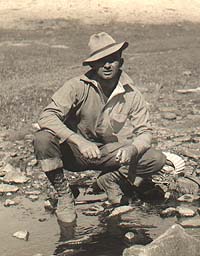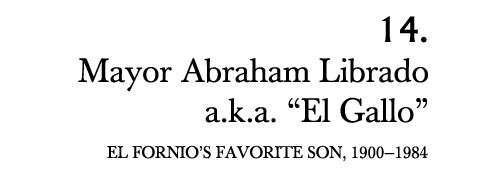|
IT IS SAID THAT
THERE CAN BE NO El Fornio without Abraham Librado. While El Fornio, California
is indeed the ancestral land of the Fornay (Fornioleno) Indians, it is
also an area, like much of the state, demarcated by land grants and contracts
between Spanish, Mexican and American citizens. But El Fornio has maintained
an aura and independence different than the counties which surround it.
That difference is because of the hard work and vision of Abraham Librado.
Born in what is known only as The Pass—the tall, long
and cavernous mountain range above the coast, extending some fifty miles
inland—Abraham Librado was the son of a long line of Fornay royalty
claiming in their lineage, among other things, heredity to Juan Baptista
de Anza. Although Anza never claimed this “son” of his, spawned
from a laison with a Fornay woman in 1776, the Librado family has never
wavered from this claim. In fact, it is common knowledge that the Fornay
abducted a handful of Spanish soldiers during their second expedition
up through California. These men disappeared for six years in The Pass—impenetrable
to all but the Fornay—only to return later with their Fornay wives
and children. While Anza spent just under two weeks in the Pass, “hosted”
by the Fornay, the tactic of strategically intermarrying with the European
outsiders was key to their survival. As Mayor Librado was found of saying,
“You don't get anywhere in this town unless you're a Mestizo.”
(In 1999, a DNA test was conducted using DNA from Anza and that from Mayor
Libraro, proving the relationship between the two. To see the the DNA
test linking these two historical figures, click HERE.)
Although born with one leg shorter than the othere (which
earned him the nickname of “The Gallo” because of the idiosyncratic
but proud way in which he walked), the young Abraham served in World War
I as an ambulance driver.
Returning after the war, Librado attended college at Stanford
University, where he obtained a Bachelor's in History. In 1925, he studied
for and passed his exams to become lawyer with the state of California.
This legacy of higher education would become a Fornay tradition: nearly
80 percent of all Fornioleno children obtain degrees in higher education.
And they are nearly evangelical in lending their skills to causes. At
any given moment in the last twenty years, there are some three hundred
Fornay doctors, soldiers, and careworkers somewhere in the world.
In the 1930s, Abraham Librado made a national name for his
community and himself by opposing U.S. government logging and oil claims
on Fornay land. Through a series of often violent but successful strikes
and demonstrations, the young lawyer and community leader was able to
negotiate greater tribal control of Fornay homelands, including the island
of Sirenas just off of the coast where all Fornay, according to tradition,
are to be buried—but these achievements eventually came at a cost.
Librado was blamed for the deaths of both Fornay and local, non-Fornay
youth involved in the burning of an abandoned farm. He was convicted of
manslaughter and inciting a riot. While enjoying great local and state
political support in his efforts to secure Fornioleno autonomy, the Federal
government saw its chance to get their man. In 1937, Abraham Librado was
sentenced to ten years in prison.
Prison time only fortified the young visionary. Living at
the prison complex at Three Hills, ten miles to the south of El Fornio
city, Librado's wife, Maria, would visit daily with their two young children,
Peter and Pearl, bringing him his favorite food (ironically, the rather
progressive Librado still partook of dolphin at a time when the practice
was dying). Other notable visitors at the time included John Steinbeck,
Clark Gable and William Randolph Hearst.
Then came the disastrous Flood of 1939. Ten inches of rain
fell in a three hour period. The Pass was inundated. Ancestral Fornay
dwellings and spiritual sites were swept down the canyons. Of a community
numbering only five thousand, nine hundred men, women and children died
in a thirty minute time period, pulled out of the pass and spread upon
the short alluvial plain before the ocean. Some seventy non-Fornay died
in the city below when the torrent of rocks, building and bodies washed
through the streets of El Fornio city. President Franklin Roosevelt, never
satisfied with the handling of the Librado trial and conviction, signed
an executive order releasing Librado so that he might lead the efforts
to rebuild his community.
Two years later, when the war in the Pacific broke out, Librado
headed up the civil defense forces in El Fornio. Many Fornioleno young
men volunteered and were drafted for the war effort. For the first time,
Abraham Librado allowed federal government agencies to the outskirts of
the Pass, where they laid plans for armaments against enemy invasion.
To this day, one can look up from the city and see the huge concrete bunkers
that were to house the large guns in case of enemy attack. Librado's only
restriction on these gun emplacements was that they face West, unable
to rotate towards Fornay lands and homes.
After the war, Abraham Librado was elected mayor of the city,
a title he held off and on for the next thirty years. He was an idiosyncratic
leader, once appointing a dog to replace him for a day when he was fed
up with legislation moving slowly through the Board of Supervisors. During
the Viet Nam war, a conflict in which his son Peter served, he sent a
letter to Ho Chi Minh asking if he would like to vacation with his family
up in the Pass. In 1973, he allowed a group of Cuban hijackers to land
at the airport so that he might see for himself what they wanted. After
visiting with the Cubans, he pronounced them “broken hearted”
and told them to leave immediately. In the confusion, Fornay agents, dressed
as drifters and non-chalants, stormed the plane, capturing the skyjackers.
Just before his death, Librado gained the ire of then-governor Ronal Reagan
by asking Mr. Reagan to reenact Librado's favorite scene from “Hellcats
of the Navy.” When Reagan refused, Librado was reported to have said,
“What kind of a politician are you?”
In 1984, “The Gallo” died. He left behind his wife,
four children and six grandchildren. He was buried, like his forebears,
on the Island of Sirenas. His funeral was attended by world and community
leaders, celebrities, writers and nearly all of the county of El Fornio,
California. President Ronald Reagan did not attend. He was not invited.
RELATED LINKS:
Nelson Mandela Organization
www.nelsonmandela.org/
Ronald Reagan Library
www.reagan.utexas.edu/
www.reaganlibrary.com/
Hellcats of the Navy
www.imdb.com/title/tt0050500/
www.rottentomatoes.com/m/hellcats_of_the_navy/
Stanford University, Abraham Librado's alma mater
www.stanford.edu/
Ho Chi Minh
http://en.wikipedia.org/wiki/Ho_Chi_Minh
http://www.vietquoc.com/0006vq.htm
Biographies of World Leaders for Kids
http://gardenofpraise.com/leaders.htm
Juan Baptista de Anza Polymerase DNA gel
http://www.elfornio.com/ef-libradoDNA.html
Wikipedia's Refs to Anza the Explorer
http://en.wikipedia.org/wiki/Juan_Bautista_de_Anza
Anza-Borrego State Park
http://www.abdnha.org/
|

